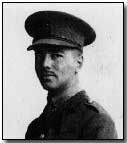Prose & Poetry - Wilfred Owenn
 Wilfred Edward Salter Owen (1893-1918)
was born on March 18, 1893. He was on the Continent teaching until he
visited a hospital for the wounded and then decided, in September, 1915, to
return to England and enlist. "I came out in order to help these boys
- directly by leading them as well as an officer can; indirectly, by
watching their sufferings that I may speak of them as well as a pleader can.
I have done the first" (October, 1918).
Wilfred Edward Salter Owen (1893-1918)
was born on March 18, 1893. He was on the Continent teaching until he
visited a hospital for the wounded and then decided, in September, 1915, to
return to England and enlist. "I came out in order to help these boys
- directly by leading them as well as an officer can; indirectly, by
watching their sufferings that I may speak of them as well as a pleader can.
I have done the first" (October, 1918).
Owen was injured in March 1917 and sent home; he was fit for duty in August, 1918, and returned to the front. November 4, just seven days before the Armistice, he was caught in a German machine gun attack and killed. He was twenty-five when he died.
The bells were ringing on November 11, 1918, in Shrewsbury to celebrate the Armistice when the doorbell rang at his parent's home, bringing them the telegram telling them their son was dead.
"My subject is war, and the pity of war. The poetry is in the pity." - Owen.
Futility
Move him into the sun -
Gently its touch awoke him once,
At home, whispering of fields unsown.
Always it woke him, even in France,
Until this morning and this snow.
If anything might rouse him now
The kind old sun will know.
Think how it wakes the seeds, -
Woke, once, the clays of a cold star.
Are limbs, so dear-achieved, are sides,
Full-nerved - still warm, - too hard to stir?
Was it for this the clay grew tall?
- O what made fatuous sunbeams toil
To break earth's sleep at all?
Download "Poems" (Project Gutenberg Text)
Not So Hidden Agenda: Wilfred Owen (Project Gutenberg Text)
Article contributed by Harry G. Rusche, website The Lost Poets.
A "conchie" was slang used to refer to a conscientious objector.
- Did you know?
